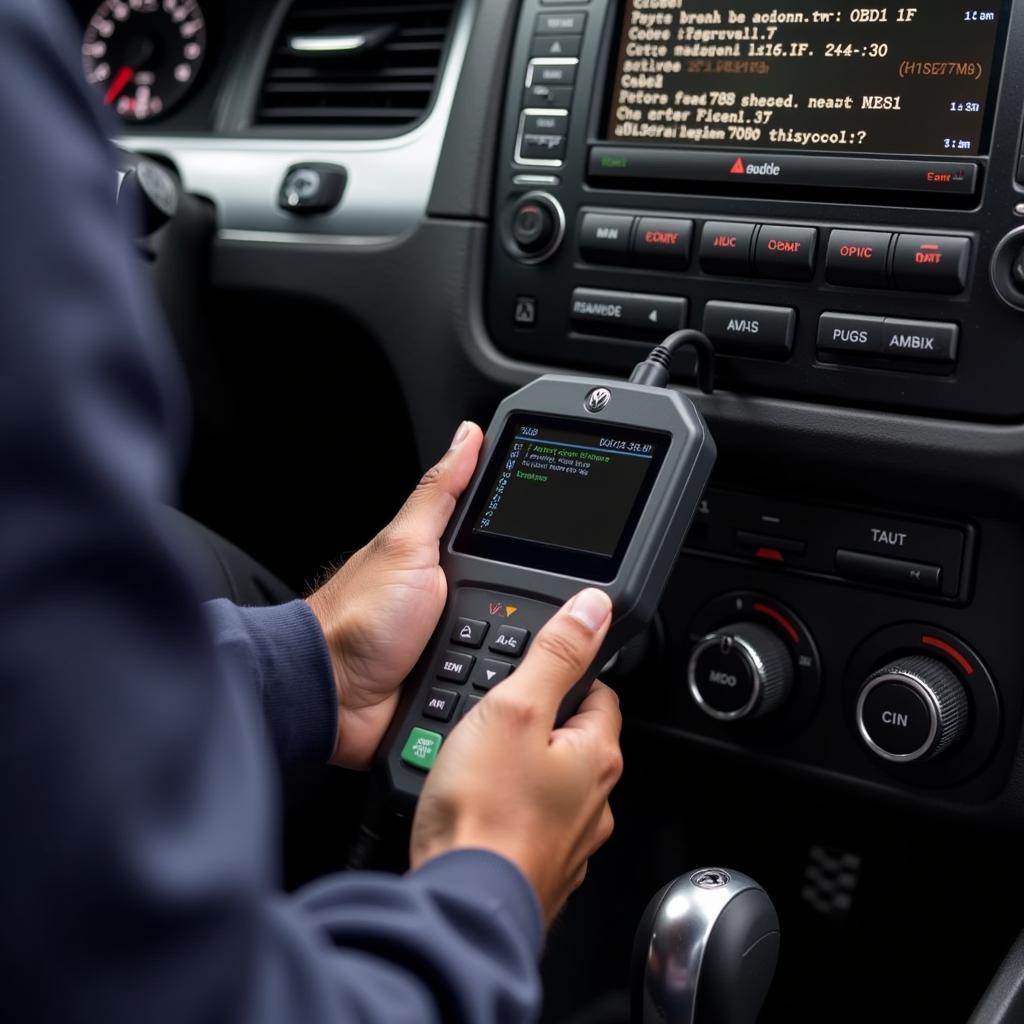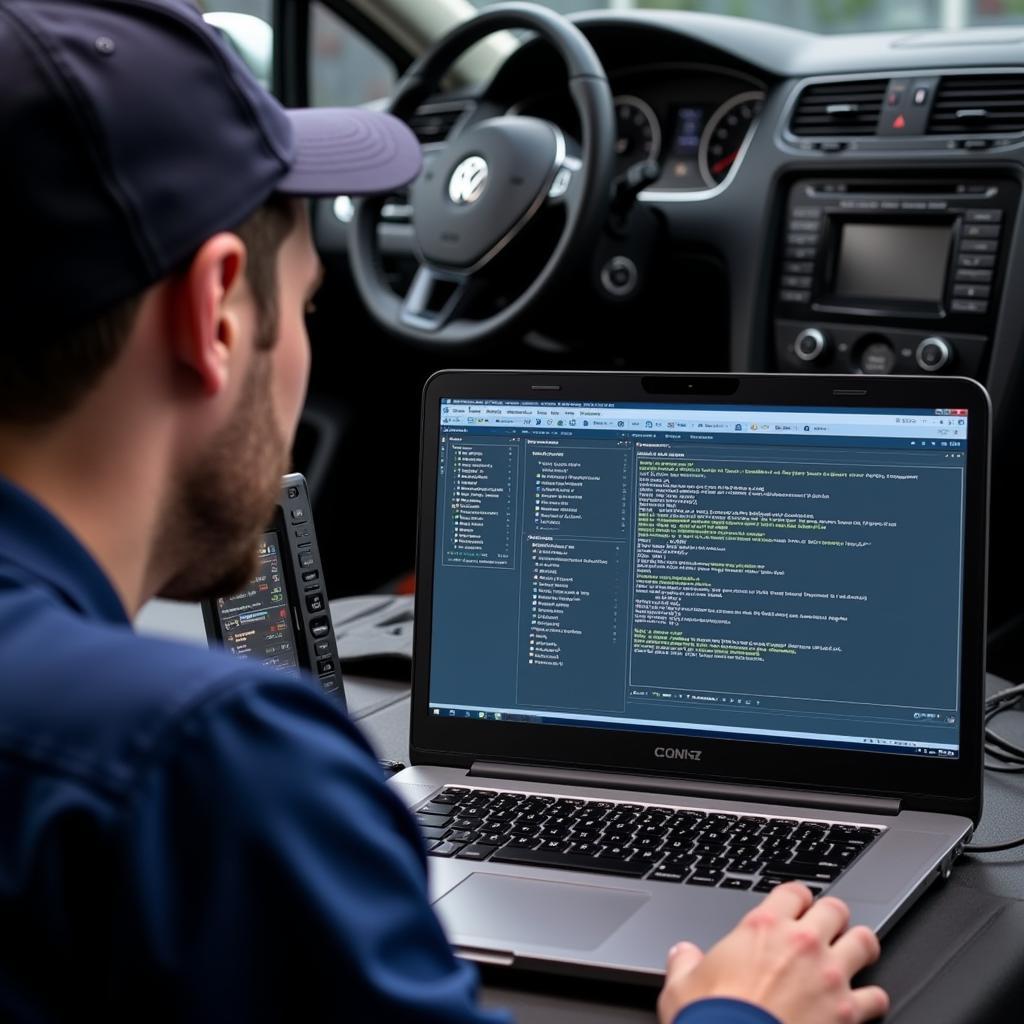Your cart is currently empty!

Decoding VW Fault Codes: A Comprehensive Guide
Understanding and resolving VW fault codes is crucial for maintaining your Volkswagen’s performance and longevity. These codes, generated by your car’s onboard diagnostic system (OBD), act as a window into the inner workings of your vehicle, pinpointing potential issues before they escalate into major problems.
Whether you’re a seasoned mechanic, a DIY enthusiast, or simply a concerned VW owner, this guide will equip you with the knowledge and resources to effectively tackle those cryptic fault codes. We’ll delve into the intricacies of VW’s diagnostic system, explore common fault codes, and provide practical tips for troubleshooting and repair. From understanding the different types of diagnostic tools to interpreting specific code meanings, we’ll cover everything you need to know to keep your VW running smoothly. You can find more information on how to read these codes at read vw fault codes.
What are VW Fault Codes?
VW fault codes, also known as Diagnostic Trouble Codes (DTCs), are alphanumeric codes that correspond to specific malfunctions detected by your VW’s onboard computer. These codes are triggered when sensors throughout your vehicle detect abnormal readings or operating conditions.
Why are VW fault codes important? They provide a starting point for diagnosing car problems, saving you time and money by narrowing down the potential causes of a malfunction. Instead of blindly guessing, you can use these codes to pinpoint the affected system or component.
How to Read VW Fault Codes
Reading VW fault codes requires a diagnostic tool, ranging from basic OBD-II scanners to more advanced software like VCDS. These tools connect to your car’s OBD-II port, typically located under the dashboard on the driver’s side. Once connected, the tool retrieves the stored fault codes from the vehicle’s computer. For a comprehensive list of VW fault codes in PDF format, check out this resource: vw fault codes list pdf.
What tools can I use to read VW fault codes? Several options are available, from affordable code readers for basic diagnostics to professional-grade software like VCDS, which offers in-depth analysis and control over various vehicle systems.
 VW Fault Code Reader OBD2 Scanner in Action
VW Fault Code Reader OBD2 Scanner in Action
Common VW Fault Codes and Their Meanings
While numerous VW fault codes exist, some appear more frequently than others. Understanding these common codes can help you quickly identify and address potential issues. For instance, the code P0420 often indicates a problem with the catalytic converter system. Another common code, P0171, suggests a lean air/fuel mixture. For a detailed list of OBD2 fault codes specific to VW, you can refer to this resource: obd2 fault codes list vw.
What does the code P0420 mean? This code typically indicates a problem with the catalytic converter system, often signifying reduced efficiency.
Troubleshooting VW Fault Codes
Once you’ve retrieved the fault codes, the next step is to interpret them and troubleshoot the underlying issue. This often involves further inspection of the affected system or component, using diagnostic procedures specific to the code.
How do I troubleshoot a VW fault code? Start by researching the specific code and its potential causes. Then, inspect the related components and wiring for any visible damage or abnormalities. Further diagnostic tests may be necessary to pinpoint the exact problem.
 VW Mechanic Diagnosing Fault Codes with a Laptop
VW Mechanic Diagnosing Fault Codes with a Laptop
ABS Fault Codes in VW Golf Mk4
The Anti-lock Braking System (ABS) is a critical safety feature in any vehicle. Understanding ABS-related fault codes in your VW Golf Mk4 is essential for maintaining optimal braking performance. More information about these specific codes can be found here: vw golf mk4 abs fault codes.
What are some common ABS fault codes in a VW Golf Mk4? These can range from sensor malfunctions to issues with the ABS module itself. Specific codes will pinpoint the area requiring attention.
VCDS and VW Fault Codes
VCDS (Vag-Com Diagnostic System) is a powerful diagnostic tool specifically designed for Volkswagen vehicles. It allows for in-depth analysis of fault codes and provides access to advanced features for troubleshooting and customization. You can learn more about using VCDS with VW fault codes here: vcds fault codes vw.
Why is VCDS useful for diagnosing VW fault codes? It provides a comprehensive view of the vehicle’s systems and allows for more detailed analysis than generic OBD-II scanners.
“Using the right diagnostic tools and understanding the specific codes is key to efficient VW repair,” says John Smith, a certified VW master technician with over 20 years of experience.
Conclusion
Mastering the art of decoding VW fault codes empowers you to take control of your vehicle’s maintenance and repairs. By understanding these codes and utilizing the right diagnostic tools, you can proactively address potential problems and keep your VW running at its best. Remember, early diagnosis and repair can save you time, money, and frustration in the long run. Contact us at +1 (641) 206-8880 and our email address: vcdstool@gmail.com or visit our office at 6719 W 70th Ave, Arvada, CO 80003, USA for further assistance with your VW fault codes. We at vcdstool are here to help you navigate the complexities of VW diagnostics and keep your Volkswagen on the road.
by
Tags:
Leave a Reply